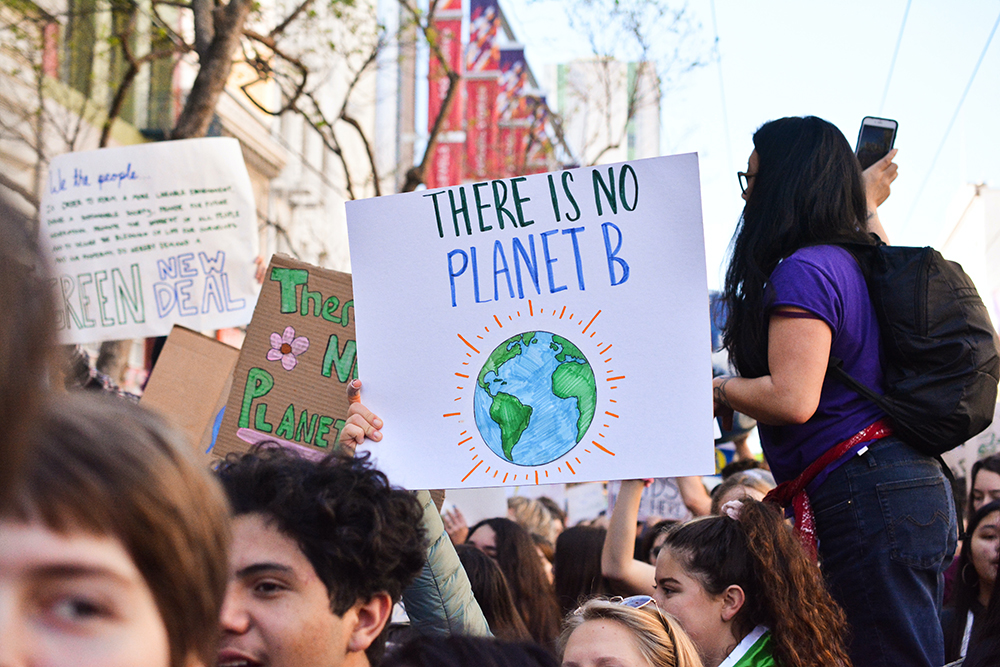As our next contributor, we are honoured to once again introduce Mr. Reinhold M. Karner to the Green Deal Malta platform! Following his three-part series on Automobility, Reinhold is once again contributing to our platform, this time sharing his thoughts on the ‘Fit for 55’ EU climate package. Reinhold explains that we can certainly change our behaviours and cut back on our demands and habits, however climate change will still happen. Therefore, we should face this sobering truth and act accordingly. Have a look at Reinhold’s article below to find out more!
Although it is (hopefully) common knowledge that the concerns about climate change are severe, the latest facts are sobering. The idea of climate protection and the “Fit for 55” EU climate package remain an illusion. What can we really do?
For a long time, I too thought that humanity could stop climate change with immense efforts. Lately however, it has become clear to me that it is impossible. We are better off facing the hard facts and adapting our strategies quickly.
In July 2021, the EU Commission presented the “Fit for 55” climate package. A highly ambitious undertaking – much like the crash of the Titanic on the course towards the iceberg, which was taken seriously too late. Yet, such an ocean giant as the world’s population, together with the global climate and environmental policies that have failed over many decades, it is far more cumbersome than a sinking super tanker.
The EU Commission’s goal of reducing greenhouse gas emissions by at least 55% by 2030 (which is just eight years away) compared to 1990 levels, seems like a naïve and childish idea. The proposed, albeit well-intentioned, drastic measures in housing, transport, production, agriculture, and forestry are of little help.
EU citizens will pay a considerable price in several sectors, ranging from mobility and transportation, to heating. The ‘de facto’ ban on internal combustion engines by requiring vehicle manufacturers operating in the European market to reduce the emissions of their fleets to zero from 2035, as though electricity generation and battery manufacturing for electric cars were emission-free (see my related article on “Automobility – desire and reality”), only makes one’s physical common sense blush. Here, too, one is lying to oneself – considerably.
COVID-19 not only brought about an unprecedented humanitarian crisis while having a massive impact on the global economy, but it also tested the effectiveness of the seemingly no-alternative climate change mitigation strategies. I was curious: ‘How would the many mobility restrictions, lockdowns, and the scaling back of public life and entire industries, unprecedented in the industrial age affect energy consumption, and contribute to the reduction of emissions and thus climate protection?’
The first figures
According to the German Ifo-Institute, the sharpest decline in international trade was experienced in the second quarter of 2020, with a decrease of more than 15%, compared to 7% year-on-year decrease in 2019. 2020 was one of the most turbulent years for the global energy industry in modern history, with a drop in value of more than 35% when compared to 2019.
According to BP’s July 2021 Statistical Review of World Energy, primary energy consumption fell by 4.5% in the crisis year, 2020 – constituting the sharpest decline since 1945. Three-quarters of this decline was in oil and was the most significant drop in oil consumption in history. Gas and coal also recorded substantial reductions.
Interestingly, the renewable energy sector, i.e. wind, solar and hydropower, grew. In terms of wind energy, to everyone’s astonishment, China doubled its capacities.
The largest declines in energy consumption occurred in the USA, India and Russia, with energy consumption in China increasing by 2.1%. CO2 emissions also experienced the most significant decline since WWII, falling by two gigatons or 6.3% back to 2011 levels.
The consumption of aviation fuels fell by 40% in 2020, that of petrol by 13% and that of diesel by around 7%.
All in all, the pandemic proved to be a shock for the energy sector, “worse” in volume than the Suez crisis of 1956, the oil price crises of 1973 and 1979 and the Fukushima nuclear disaster of 2011.
However, electricity consumption declined only minimally by 0.9%, with the share of electricity generated by renewables rising from 10.3 to 11.7%, and that of coal falling by 1.3 to 35.1%. In addition, a study by the Carbon Tracker Initiative suggests that electricity production from fossil fuels peaked in 2018. In the future, many developing countries may surpass coal and gas in expanding their energy supply, thanks to modern alternative technologies. In 2019, all things considered, the average US citizen consumed more than 10 megawatt-hours of electricity per capita, according to OECD data, while Europeans and Chinese consumed less than 6 megawatt-hours and Indians and Africans only about one megawatt-hour. By 2040, 88% of the rising electricity demand is expected to come from emerging economies – led by China, and followed by India and other countries like Vietnam.
With the world’s largest population and its rapidly increasing hunger for energy, China plays a vital role in the world’s climate as the number one global greenhouse gas emitter. The study’s authors assume that almost 40% of the world’s rising electricity demand will be generated in China by 2040. That coal-fired power will continue to be primarily expanded for this purpose until at least 2025.
All experts and analysts from BP (Giulia Chierchia, Vice President for Sustainability), and the Global Head of sustainable investing at the world’s largest asset manager BlackRock (Paul Bodnar), as well as the highest-ranking climate politician in Great Britain (Nigel Topping), all agreed on the following at the presentation of the latest figures: The goals of the Paris Climate Agreement of 2015 to limit the temperature increase to 1.5 to 2 degrees Celsius compared to pre-industrial times (1800) will surely not be achieved.
Moreover, the hunger for energy continues to rise. This would be increasingly cushioned by growth in renewables. Still, a significant doubt and unsolved problem is: can all energy producers who, with their coal-fired power plants and old technologies who are among the biggest polluters, ever be taken off the market globally?
The virus took priority
Because the protection of people from a virus was suddenly more important than anything else, governments across the globe dramatically restricted our freedom of movement and thus our professional and business life for many months. Where possible, companies radically switched to home offices. Shops, restaurants, and hotels were rigorously shut down, we all were faced with restricted hours open to the public and footfall for a few retail shops was limited to a minimum, events were banned, and countries were sealed off.
As a result, ordinarily crowded roads were suddenly massively less busy, at times even empty, aircraft fleets were grounded, the travel and tourism industry came to a standstill, global supply chains stuttered severely, and consumer demand plummeted. Overall, international trade flows were fundamentally affected and general concepts such as just- in-time production began to falter. Container shipping, which had revolutionised global trade and is transporting nearly 80% of EU exports to non-EU member countries, was hit by a double supply and demand shock. The shipping system could not adapt quickly enough, leaving containers in the wrong places and driving shipping prices to absurd levels.
Meanwhile, the spectre of the Covid pandemic is running out of steam in more affluent countries, only thanks to the achievement of scientists through rapid vaccine development and availability. In some areas, more robust variants are returning. Globally, the pandemic is still far from under control, at least not before 2024.
With all the preaching about the no-alternative strategies for climate protection, it was to be expected that the pandemic would have a massively positive effect on climate protection after all, as the pandemic put an unprecedented brake on so many activities and processes. However, one should be aware that the enormous restrictions imposed on us over so many months has already reached, or even exceeded the limit of what many people could bear, whether personally or economically. Even more and longer restrictions would hardly be supported by the population at large. This sadly shows us that most people will hardly allow themselves to voluntarily be permanently restricted, out of goodwill or for example, because of climate protection.
If no pandemic had intervened, the climate issue would, of course, have remained at the top of the global agenda. That is why now – especially in more prosperous countries and due to the catastrophe in July 2021, with so many deaths and devastation caused by torrential rainfalls in Belgium, Rhineland-Palatinate and North Rhine-Westphalia in Germany – many feel that climate protection must now be dealt with all the more intensely, even more, even faster, and preferably the day before yesterday. In our modern times, we think that we have found the key to wisdom against climate change and climate protection, through the “Green Deal” and the “Fit for 55” package.
However, the learning curve shows us that the impact of the energy shock caused by the pandemic on climate protection is – unfortunately – quite sobering. Even the shock emergency braking for the global economy, mobility, and consumption by the pandemic apparently could not impress climate change in the slightest. All the forcibly induced effects are far from sufficient. With its strategy, the idea of climate protection can neither reverse nor significantly slow down climate change.
Why is that? This is because climate protection policy is inherently flawed.
Climate change has always existed
Climate change has been around for millions of years, not just now- it was around even before humans populated the world, even when we were still hunter-gatherers.
Climate change is a principle of our planet Earth. Climate stability has never existed. Climate change is part of the essence of our world! Without it, there would probably be neither biological development, nor what we call Darwinian evolution. This planet – like all life, all developments, and all events – has always consisted of change.
But does humankind control the world?
The idea that humankind controls the world and shapes it freely according to its wishes is entirely absurd. Humankind only has little control over the world around it. We humans are not that powerful. To prove this, just look at the pandemic, which has given this self-opinionated attitude a serious battering.
The only way we could have possibly reduced our contribution to accelerating climate change to zero would have been if we had remained in the realities of the last centuries, if we had not discovered electricity, invented the steam engine and the internal combustion engine. If we had not pushed ahead with industrialisation, left oil and natural gas in the ground, kept mobility and consumption down, and not developed our demand for speed and unrestrained growth, we would probably have done little harm to the climate. However, having said this, we still would not have succeeded to the extent that would have been necessary to return to moderate weather conditions.
This said, we can’t seriously think we can unhinge the world’s laws and stop climate change just by changing our behaviour a little.
Who participates at all?
What we are doing now, or would like to do, is definitely not supported by the vast majority of the entire world’s population. Let’s also not forget that we in Europe already had only 13.4% of the world’s population in 1960, and now , following Brexit and due to exorbitant population growth in other continents, we represent only approximately 5.9%, constituting a twentieth of the world’s population. The climate protection idea of the few pioneering countries, which we assume that the majority in our own country is enthusiastic about, and will do or refrain from doing everything necessary for it, will in reality – even if it says otherwise on paper – not even be entirely welcomed within the EU. We are still facing an acid test here, as most lobby groups will still be running hot.
Climate change will happen – no matter what we omit
There is no doubt that many things are out of balance and are in the hands and responsibility of us humans. A considerable number of people behave too inconsiderately,-too greedily towards other humans, nature, the planet and its resources, flora, and fauna. This needs urgent correction.
However, the fearmongering and the guilty conscience are used to suggest the false belief that any measures can stop or even reverse climate change. The narrative of this irrational guilty conscience is that “I am at least a little bit to blame, a little bit responsible, because even just by living, I leave an ecological footprint, I consume oxygen, and I breathe out CO2”. It would probably not change anything if a few million out of a few billion people no longer used electricity, no longer drove a car, or no longer ate meat.
And this is precisely what the lessons from the Covid pandemic show:
we can certainly change our behaviour and cut back on our demands and habits – only the climate apparently hardly feels a thing. Climate change – and many people don’t want to hear this- will still happen. We should face this sobering truth and act accordingly, above all, to protect ourselves because climate change has always happened.
The bottom line is that it doesn’t matter to the climate what we do now.
It does not mean that the enormous end-time scenario is coming. But it does mean that life will become very hard, possibly too hard, for people in some places on Earth. That resources will become scarcer, and that as a result there may not be a continued rapid increase in the world’s population, but rather a more moderate or even a declining one. In many places, conditions will become so harsh that it will hardly be possible to live there – with many consequences, including heatwaves, more circulatory diseases and heat deaths, water shortages, droughts, heavy rains, resettlements, migrations, more famines, even changes in the attractiveness of tourist destinations with losers and winners.
Of course, this is still not a licence not to worry about climate change and to continue to be reckless with the environment. Everything we sow comes back to us, as the world’s most giant rubbish plague of microplastics shows. But at the same time, we should not run after senseless measures to supposedly stop climate change.
Endless growth is unnatural
The vital central question we all have to ask ourselves on the other hand, is: What do we really need? Our current economic system is geared towards limitless progress, towards permanent growth. ‘Growth’ has become one of our industrialised buzzwords, with a halo around it. For it suggests that growth is indisputably necessary, something good and the ultimate salvation for the permanent paradisiacal prosperity of all on Earth.
What kind of ethical understanding is that anyway? More and more and even more – of everything. Always growth, more sales, more demand, more production, more distribution, more money in circulation, more consumerism. It’s all about the basic idea: more is more – growth, growth, growth! Yet other things have long been important – sustainability, safeguarding our finite planet as the basis of life for humans and nature, therefore living more in harmony with nature instead of against it. More industry, trade and services happily serve an ever-greedier market – fortunately, more people are understanding this. At the same time, growth does not necessarily make people richer or generate real added value.
Eternal growth would be a pipe dream – unless there were forms of growth that were not constrained by competition or lack of resources. But we are still chasing this illusion. There is no growth without limits. There is also no progress without limits.
What exists is a permanently functioning nature. On the one hand, the universe has an urge to grow organically, but on the other hand, it knows its limitation. Let’s just think of our bodies, our organs. These grow and thrive at first, but if the growth does not stop, one
would go to the doctor, diagnose a disease, and stop the growth. Our internal organs miraculously know when they are big enough to ensure healthy interaction. Most companies would also find it strange not to strive for growth. But must this continue forever? Or can a company at some point be a fully grown adult and just deliver or provide what customers need?
GDP – the misleading prosperity index
Gross domestic product (GDP), the officially accepted measure of economic growth, is a dangerously flawed indicator in this respect. It is not the measure of all things or the index of prosperity par excellence. For example, GDP ignores all activities in which money does not change hands.
Given this and numerous other errors in reasoning and measurement, it is also an aberration to try to compare growth rates between different countries and currencies. The truth is that we do not know how well our economy or our society is actually doing and growing at any given time, not even in economic terms, let alone in terms of human well- being. As Robert Kennedy noted back in 1968, “The gross national product does not allow for the health of our children, the quality of their education, or the joy of their play. It does not include the beauty of our poetry or the strength of our marriages, the intelligence of our public debate or the integrity of our public officials. It measures neither our wit nor our courage; neither our wisdom nor our learning; neither our compassion nor our devotion to our country; it measures everything, in short, except that which makes life worthwhile.”
Far-sighted economists have therefore launched several initiatives to reconcile the economy, social affairs, health and happiness and the environment with a new index system, such as the “Beyond-GDP” initiative, supported by the EU Commission, the EU Parliament, the Club of Rome, the OECD and the WWF in 2007.
It is not for nothing that the United Nations defined the 17 Sustainable Development Goals (SDGs) in the 2030 Agenda in 2015. They include the environment, natural resource management, climate change, energy, water, education, health, poverty reduction, peace, employment, and the sustainable use of our oceans.
Our ideology for sustainable action should therefore be: “Not constantly more and limitlessly bigger, but above all, better!” We should put sustainable quality before quantity – in everything.
Growth, on closer inspection, turns out to be a confusing but straightforward goal that should generally be pursued with caution and circumspection. A society that believes that “more” is always “better” will be an envious and dissatisfied society that will eventually seek war, as history teaches.
Even a company cannot grow exponentially forever. At some point, it simply becomes too big to be run successfully; it becomes intolerable to the market, it collapses or dissolves or is broken up or reorganised or fundamentally realigns itself. It is more satisfying and even often more profitable to grow in terms of quality and competence instead of just getting bigger all the time.
The intrinsic “Green Deal”: now the priority is to protect ourselves
We cannot overcome climate change. In the course of global warming, more and more zones are emerging on Earth in which people cannot survive without technical aids.
We should approach this differently, revise our strategies with new reasons and minor panic. Camilo Mora (a climate researcher at the University of Hawaii) and his team already found through a study (Nature Climate Change) conducted in 2017 that about 30% of the world’s population is exposed to a lethal combination of heat and humidity on at least 20 days every year. But that percentage is expected to rise to almost 50% by 2100 – even with drastic reductions in greenhouse gas emissions.
Of course, we could still pursue growing ecological and climate-neutral consumerism. Still, we should also stop the widespread “greenwashing” by ruthless profiteers, which ranges from empty promises to deliberate deception. As part of the Green Claims Initiative, the EU Commission examined company websites for the extent of greenwashing in Europe and found in almost half of them that the “green” claims on the websites about the products and services are exaggerated, false or even misleading.
However, the central point, which must now be at the top of the list, is to concentrate on what we can and must actually do now, namely, to protect ourselves and our surroundings from climate change as a matter of priority. Protect in the sense of how do I build, where do I build, how do I live, where do I need to travel to or also, how do I organise my everyday life, my environment, what do I value and so on – this is the crucial point – what moderate and respectful relationship do I cultivate with the environment and nature, with sustainable coexistence?
The ecological imperative
We should sensibly concentrate on what is feasible and appropriate for human beings with an ecological imperative and thereby place the protection of humans and nature, and not economic growth, at the forefront. For it is precisely the constant aggressive strive for growth, for limitless more, that tempts too many people to behave ruthlessly, to be obsessed with power, to the radical and disrespectful treatment of each other, and of nature and Mother Earth.
We could find a helpful way to make a feasible, sustainable positive contribution. However, this does not have much to do with climate protection, but rather with a different way of fulfilling fundamental human realities. To do this, we should look at our inner values and what really serves us as human beings.
However, this inevitably leads to a thorough questioning of our current economic model. Most leading politicians and business leaders do not want to touch this hot potato: they hope it will avoid them. But it will not.
As most experienced people in rich countries know, consumption, no matter how luxurious, does not bring lasting satisfaction. What is bought is soon standing around again somewhere, is no longer trendy, becomes superfluous, is thrown away, or even causes trouble. We have become an insane throwaway society with no respect for finite resources. Let’s reduce what we really want to have to what is actually a daily, lasting joy for us! Let’s look for alternative ways to achieve the well-being, the feeling of well-being, the satisfaction and recognition that we have so far – in pretence, under all the pressure to perform and the hectic pace – so often obtained through consumption, often overpriced, with a factual, technological, or fashionable expiry date.
Such a contribution to climate protection does justice to an essential insight: inner abundance is more important than outer abundance, inner freedom is more important than outer freedom, greatness, power, meaning, and value are more important than the outward signs, i.e., the purchased insignia for power, meaning and value.
The Day of Earth Overload
Nature does not know the term “rubbish”; it makes something out of everything. Why don’t we do the same? One of the most important helpful measures would be to focus our thinking and actions on reuse cycles, on an entirely circular economy in particular. Let’s make it the standard, for the general conservation of resource consumption, and for the reduction of our ecological footprint. At the same time, however, we remain human beings in our circumstances. We simply cannot go back to the Stone Age – and even if we could, it would not stop climate change. But it would prepare us for a more appropriate way of dealing with each other and with resources, nature, and our beautiful planet.
The crux of the matter is from every perspective: Wanting to protect the environment and at the same time focusing on limitless growth are simply mutually exclusive; it doesn’t work. It is a widespread, fundamental error in thinking.
“Earth Overshoot Day”, the annual day when human demand, our annual needs or hunger for resources, exceeds the naturally renewable resources that the ecosystem can regenerate throughout the year, is occurring earlier and earlier in the calendar year. The increase is dramatic from a global point of view, but even worse if we look at some rich countries in isolation. While in 2021, this deadline is now reached globally on the 27th of July, which is three weeks earlier than in 2020 (22nd of August 2020) despite the pandemic, it was reached on the 23rd of September in 2000 and the 29th of December in 1970 and never occurred in the years before. However, in Luxembourg and Qatar, it is already reached on the 11th of February, and in the USA on the 14th of March. If all the Earth’s inhabitants lived as we do in the EU, the world’s annually renewable natural resources would already be used up on the 10th of May.
If each individual makes their contribution, takes their power into their own hands, not to pursue hopeless world climate protection, but to live sustainably right on their own doorstep, then a great deal would already have been achieved.
In this way, we could protect nature in the best sense of the word, use resources responsibly and sparingly, refrain from environmentally damaging subsidy and tax policies and take species protection seriously in accordance with Albert Einstein’s warning: “If the bee disappears from the surface of the Earth, man would have no more than four years left to live.” We could avoid disruptive waste as far as possible through consistent reuse cycles, prevent environmental damage and check beforehand what is ecologically safe and what is not – see, for example, some other articles I wrote on “electric cars” or “dangerous nanomaterials”. In addition, we could specifically engage in reforestation, because as researchers from the Swiss Federal Institute of Technology (ETH) calculated, this could at least slightly increase the amount of rainfall in summer. A study from 2019 concluded that we could bind two-thirds of all emissions caused by humans if we planted one billion hectares of forest worldwide. After all, the “Fit for 55” EU climate package envisages planting three billion trees in its forest strategy.
Globally, we should tackle the maintenance of cleanliness and the handling of our most important element of life – water – and our masses of waste dumped everywhere, including microplastics.
Nor is our water there to cool highly radioactively contaminated ruins of our arrogance. Humans should not leave nature and the hundreds of generations to come with the still completely unsolved problem of highly radioactive nuclear waste that will continue to radiate for more than 10,000 years and represent an expensive and hazardous legacy.
Animal and species protection
And let’s actually take care of animal, species and plant protection! We can; it starts on everyone’s doorstep. Let us work to end or at least reduce senseless suffering and waste of animal and plant resources. Let us understand that all creatures, including animals and plants, have dignity, and are living beings inhabiting the same planet. Anyone who is a responsible farmer or has a heart for animals and nature knows this, as the indigenous peoples and our ancestors knew and respected.
Of course, one person cannot change the world, nor the economic system. We can’t turn everything upside down either; you can’t swim entirely against the tide – that might not work. But at least when it comes to the small things, we can all do a lot. Above all, we can keep a sense of proportion and stick to moderation and balance. If many do that, it will have an enormous effect.
Reinhold M. Karner, FRSA.
(RMK ThinkLab)
Contributor(s)

Reinhold M. Karner, FRSA
Reinhold M. Karner, FRSA, an international business advisor and economist, is the founder of ‘R·M·K- The success multiplier'. Reinhold is the Chairman of the Board of Governance of AP Valletta, as well as being the Chairman of various other supervisory boards and think tanks. He is based in Malta, Austria and London, and has over 40 years of experience as a multinational entrepreneur in management consulting, software and IT. Throughout his career, Reinhold has been awarded several awards such as the ‘Best of the Best Management Consultants’, the ‘IT Entrepreneur of the Year’, and the ‘Entrepreneur Shooting Star’. Reinhold has also been appointed as RSA’s (Royal Society for Arts, Manufactures and Commerce) Fellow Connector for Malta and Austria. Reinhold’s motto is that: ‘There is no great art to success. The great art is to maintain success!’






